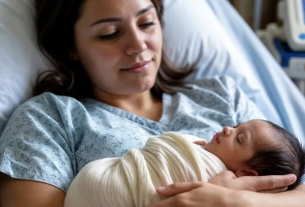Graduation night was supposed to be a shining bridge between childhood and adult life, but for Alisa it turned out to be just another door slammed in her face. The air in the apartment was thick and stale, smelling of old cabbage and dashed hopes.
“Go to the dance? Buy a dress?” Her mother, Vera Ivanovna, spoke in a voice as flat as a board and cold as a knife blade. “Foolish nonsense. Spending money on a rag you’ll wear once and throw away is the height of frivolity.”
Alisa stared silently out the window where the sunset spilled scarlet wine across the sky. She had already imagined the dress—pale blue, like a scrap of sky, sewn from the lightest fabric that would whisper with every movement.
“You’ll get your diploma and come straight home,” her mother continued in a tone that brooked no argument, tying on her apron. “You’ll take Artyom to practice. He won’t wait.”
“But, Mom…” Alisa’s voice betrayed her by quivering. “How can I just leave? Everyone will be saying goodbye, taking pictures… Could I at least stay until the evening starts? I’ll slip away quietly, I promise…”
Vera Ivanovna turned to her slowly. Her eyes, gray and bottomless like a well in an abandoned village, fixed on her daughter. There was not a drop of warmth in them, only the usual fatigue and irritation.
“I’ve said all I’m going to say. Don’t make me repeat myself.”
Disobedience was the same as suicide. Alisa had known that since infancy. She nodded silently, swallowing the lump rising in her throat. Another treacherous tear rolled down her cheek and fell onto her palm, leaving a salty spot.
The school assembly hall exploded with laughter, music, and jubilant shouts. The air trembled with happiness and anticipation. Girls in glittering dresses fluttered like butterflies; boys in stiff suits tried to look grown-up. Alisa sat on the very edge of her chair like a ghost at her own celebration. Her old calico dress looked like an ugly blot against the backdrop of collective delight. She felt the pitying or curious glances thrown her way, each one a pinprick.
As soon as the coveted red folders were handed out, she bolted for the exit, clutching her diploma to her chest like a shield. Her heart was tearing in two. She ran down the street, not watching where she was going, and at last the sobs burst out—dull, bitter, desperate. The granite sidewalks were merciless to her worn-out shoes. And once again, with cruel, crystalline clarity, she knew: her mother didn’t love her. Had never loved her.
That knowledge had lived in her always, from the moment she began to be aware of herself. It was as integral as breathing. Vera Ivanovna hardly spoke to her—she only gave orders. Her touch was rare and always businesslike—straighten a collar, tug down a hem. Never a tender look, a goodnight kiss, a comforting hug. The punishment for the slightest offense, a wrong word, a cup broken by accident, was an icy, all-annihilating boycott. Her mother would simply stop acknowledging that she existed. She behaved as if Alisa weren’t there at all. It could last for weeks; once it stretched into two agonizing months. Alisa still couldn’t remember what she’d done to deserve it. As if she’d erased the pain from memory to stay sane.
She tried with all her might to be good. She excelled at school, almost all top marks. She washed floors, did laundry, ironed, without complaint. She dreamed that one day her mother would notice her efforts, smile, stroke her head, and say, “Well done, daughter.” But no. Her mother always found something to fault, something to scold, a new turn in their silent war.
From snatches of family conversation Alisa knew that before she was born her parents had gone childless for a long time. Dozens of doctors, tests, treatments—nothing helped. And then, when all hope had run dry, she was born.
“Strange,” the girl often thought, falling asleep in tears. “They waited so long, but when I came, they weren’t happy at all. Otherwise why is it so cold? And Dad… He’s kind, but somehow distant, as if I’m in his way. But Artyom… that’s different. They dote on him.”
With her brother’s birth, the unhappy part of her childhood ended altogether. She was only eight then. Her mother seemed to forget how old her daughter was. The whole house fell onto her thin shoulders: cleaning, shopping, washing and ironing diapers, watching her brother. And still—she had to get nothing but top marks. A “B” in her gradebook was a catastrophe.
When Artyom got older, Alisa took him to kindergarten, then to school, to his clubs. Cooking was added to her duties. Not all of it, of course, but dinner every evening was her headache. She tried, searched for recipes, dreamed of surprising them, of pleasing them. But she never once heard a simple “thank you.”
By seventeen, a conviction hard as steel had settled in Alisa’s soul: in this family she was nothing but a servant. Unpaid, multi-purpose, and permanently obligated. Her mother and father needed her for nothing else.
“So be it,” she thought raggedly, wiping away tears. “I’ll leave after school. Far away. I’ll get into university. Then they’ll see how they manage without me.”
That evening, after bringing her little brother home from practice, she mustered all her courage at dinner and voiced her plans.
“I’ve decided to apply to Voronezh University. Philology.”
Without looking up from her plate, her mother tossed back, “What for?”
“What do you mean, what for?” Alisa was taken aback. “I’ve only got one B on my diploma. I have a good chance…”
“Don’t even think about it,” Vera Ivanovna said, her voice taut with a peculiar inner tension, as if she’d been waiting years for this moment. “You’re not going anywhere.”
“Why?” Desperation crept into Alisa’s voice.
“Sonny, go to your room and play,” her mother said unexpectedly gently to Artyom. “You’ve had enough to eat, haven’t you?”
The boy nodded obediently and disappeared behind the door. As the latch clicked, her mother lifted her gaze to Alisa, and in it was such naked, poisonous malice that the girl went cold inside.
“And who’s going to take care of Artyom? Who’ll take him to practice? He’s too young to wander the city alone.”
“I could drive him,” her father said quietly, not lifting his eyes from the table.
“You?” her mother shrieked, leaping to her feet. Rage twisted her face. “And why not her? Did I waste all those years, my strength and health, on someone else’s child for nothing? Let her at least work off her room and board!”
Alisa flinched as if struck by lightning. The fork clattered from her trembling fingers onto the plate. Her ears rang. She must have misheard. She had to have misheard…
“Why are you like this, Vera?” her father muttered wearily. “This isn’t the time…”
“I’ve kept silent too long! Let her finally learn who she really is! University, is it! To the factory with her! Let her get a job on the plant! We’re not obliged to carry her on our backs any longer!”
The air in the room thickened, turned heavy and prickly. Numb, Alisa sat unable to move. Her world—already shaky—collapsed in an instant, shattering into a million sharp shards. “Someone else’s child.” The words rang in the silence like glass.
“Get out,” her mother hissed, pointing at the door.
Alisa stood up mechanically. Her legs were cotton. She looked at her father, begging for help, for an explanation, but he only lowered his head further, hunching his shoulders as if trying to become invisible.
“Out, I said! Out of my kitchen!” her mother screamed, now hysterical, and there was something animal, primeval in her cry.
The cry tore Alisa from her chair. She ran out of the apartment, not knowing what she was doing, and raced through the streets of her hometown, which had suddenly become alien and hostile. The streetlights stretched into long, ugly shadows, and in her temples only one word pounded: “Stranger… stranger… stranger…”
Stopping to catch her breath, she suddenly knew where she could go. The one person who had always looked at her with warmth.
“Grandma,” she breathed when the door was opened by an elderly but still sturdy woman with wise, kind eyes. “Grandma, what she said… Is it true?”
Her grandmother, Anna Vasilievna, silently let her in, seated her in an armchair, poured tea. She listened to the halting, sob-choked story. Her face grew sorrowful and very tired.
“I didn’t think I’d live to the day when you’d have to find this out, my girl,” she began quietly. “But as awful as it sounded, Vera told the truth. You’re blood only to my son—your father.”
“How?” Alisa whispered, her vision swimming. “Who… who is my mother?”
“One of his students. Young, pretty, flighty. They had an affair. She got pregnant. She thought that since he and Vera had no children, he would leave and marry her. But Sergei—your dad—had no intention of destroying his family. He offered her money, help, but not marriage. Then, in a fit of temper, she declared she would leave the baby at the hospital. Sergei couldn’t allow that. He said, ‘Have the child. I’ll take the baby and raise it as my own.’ And that’s what he did. He came to Vera and told her everything. She was, of course, in a terrible shock. She was going to file for divorce. Didn’t speak to him for a week. And then… she agreed. Said she would raise you as her own. I think she hoped she could love you. But you can’t command the heart. I offered more than once—give the child to me, I’ll raise her. But she refused outright. Pride, I suppose. She didn’t want gossip spreading through the town. And then Artyom was born… and a helper was found for you. That’s the whole story, my dear.”
“Where is she now? That… woman?” Alisa’s voice was as quiet as the rustle of leaves.
“I don’t know, dear. She never once got in touch. She told your father she wanted to start a new life. She disappeared. Don’t despair. This is the lot that fell to you. You should be grateful to Vera that she didn’t throw you out, that she raised you and gave you an education. And to your father, that he didn’t chicken out and took you in. I didn’t learn the truth right away either. My daughter-in-law doesn’t care for me; we rarely saw each other. And as for university—that’s right. Apply. It’s time I truly took care of you. I have some savings. Not much, but enough to rent a room in Voronezh and to live on. And if you get a dorm room—all the better. Just don’t lose heart. You didn’t deserve any of this. You deserve a bright life.”
“Grandma, can I… move in with you? Now? I can’t go back there. I can’t…”
“Of course you can. Your room has always been waiting. You’ll prepare for the exams in peace.”
“Grandma… should I try to find her? My… mother? Maybe Dad knows something?”
Anna Vasilievna thought for a while, gazing sadly out the window.
“I don’t think that’s a good idea, child. If she wanted to see you, she would have made herself known long ago. Who knows what’s in her heart and how her life turned out? Your appearance might only upset her. She’s a stranger to you, really. Don’t tear open old wounds.”
“You’re probably right,” Alisa pressed her cheek to her grandmother’s warm shoulder, brushing away treacherous tears. “So you’re the closest person I have.”
“Not only me, dear. Your father too. And your brother. They love you truly. It will all work out. Do what’s right, and what will be, will be.”
Alisa got into university. Through all her years of study her grandmother was her main support. Her father helped too, secretly passing her money, calling on the sly and asking in a trembling voice how she was. Vera Ivanovna never forgave “the ungrateful freeloader’s escape” and her mother-in-law’s and husband’s “betrayal.” Her rage simply calcified inside, turning into a quiet, everlasting hatred.
After graduation Alisa received her job assignment and moved to the far end of the country, the Far East. There she met her future husband and had two children—a boy and a girl. She built a life of her own, a fortress filled with the warmth and love she had been so starved of in childhood.
For more than twenty years she didn’t go back to her hometown. She came only once—for her grandmother’s funeral. She spent the night in the old apartment that smelled of childhood and safety. Later it turned out that Anna Vasilievna had left that apartment to her beloved granddaughter.
That act sent Vera Ivanovna into a fury.
“Feeding and watering her should have been enough for that ingrate!” she screamed at her husband. “Now she’s supposed to get the apartment too? On what grounds? Your mother’s gone senile!”
“I don’t understand why you’re working yourself up,” he parried calmly, as he had learned to. “Alisa’s not to blame. It was my mother’s decision.”
“She’s to blame for being born!”
“Do you hear yourself?” For the first time, steel sounded in his voice. “If anyone’s to blame, it’s me. And you know… I don’t regret for a second that I have such a daughter. On the contrary—I’m proud of her.”
Alisa chose not to claim the inheritance. She and her husband decided that together. She thanked her grandmother silently and let that part of her past go.
A few years later, after her father’s sudden death, the official owner of her grandmother’s apartment became Artyom. He sold it immediately and, to Alisa’s great surprise, came to her—clear across the country.
He showed up unannounced on the doorstep of her cozy home, hugged his sister tight, and declared without preamble:
“I’m going to live near you. Your city’s got prospects. The climate’s fine. Will you help me choose an apartment?”
Alisa and her husband exchanged a quick, bemused glance.
“Hey, you’ve got me wrong!” Artyom laughed. “I’ve got the money. Just help me pick the neighborhood, take a look around—I’m useless at this. Hard to do it alone.”
“And what about Mom?” Alisa asked carefully. “She’s all by herself.”
Her brother’s face darkened.
“It’ll do her good to be alone. I’m tired of her perpetual hatred and spite.”
“Still? After all these years?”
“Still. She’s mad at you, at Dad, at Grandma. She loves only me. But you know… that smothering, possessive love makes me want to howl sometimes. I’m not a thing.”
“You shouldn’t have done that, brother. Leaving her alone.”
“Wrong to come to you? I thought you’d be happy.”
“I’m overjoyed to see you, truly! It’s just… I feel sorry for Mom. She’s not young anymore. What if she falls ill and needs help?”
“If she needs help, social services will call, or she can call herself,” Artyom cut her off. “Enough. I don’t want to talk about it anymore.”
Two years passed. Quiet, peaceful years, with her brother nearby. But one day Alisa couldn’t stand it. A piercing pity and some strange, half-understood sense of duty made her buy a ticket and go back home.
She stood at the familiar door—the very one behind which her life had passed, full of hurt and tears. Her heart pounded in her throat. She rang.
Slow, shuffling steps sounded behind the door. It opened. On the threshold stood an aged, stooped, completely gray woman. Nothing remained of the former authority and hardness.
“Hello, Mom,” Alisa said softly, cautiously.
Her mother looked at her with a clouded, uncomprehending gaze, as if peering at a ghost.
“You?” she finally breathed, stepping aside to let her in. The apartment was clean but unkempt, empty and cold. “What do you want? Why did you come?” she asked, trying for gruffness, but sounding only weary and spent.
“I’ve come for you, Mom.”
“For me?” The woman blinked in puzzlement.
“My brother and I want you to move to us. To live nearby.”
Vera Ivanovna froze. A spark flickered in her eyes—hope? fear?
“Artyomka…” she whispered. “So he sent you?”
“Of course. He misses you.”
“Why didn’t he come himself? Can’t he visit his old mother?”
“He’s swamped at work, and his wife is about to give birth… Don’t you want to see your grandson?”
“Grandson?” For the first time something alive sounded in her voice. “A boy?”
“That’s what the doctors say.”
“And why did he leave?” she muttered aloud, not looking at Alisa. “What didn’t he have here? He could have stayed…”
“My children want to meet their grandmother too,” Alisa went on gently.
“Children?” Vera Ivanovna looked up at her in genuine amazement. “You have children?”
“Two, Mom. Pavel and Larisa.”
The woman went still, absorbing this.
“Why did you give the girl my name?” she asked suspiciously.
“It’s a beautiful name. And besides… You’re my mother. To me.”
“Don’t talk nonsense,” the old woman waved a hand, the gesture feeble. “We both know the truth.”
“For me, the truth is this. You raised me, you taught me everything, you forced me to gnaw the granite of learning and be strong. If not for you… I don’t know who I would have become. So thank you, Mom. For everything. For everything you taught me, even the bitterest.”
She listened, and the stone that had been her heart seemed to crack. Tears welled in eyes long used to coldness. She took a hesitant step forward, then another—and suddenly hugged Alisa, impetuously, awkwardly, like an old woman.
“Forgive me, my girl… Forgive a foolish old woman…” she sobbed, clinging to her shoulder. “My whole life… my whole life wasted on mistakes and malice…”
Alisa hugged her back, feeling the years of pain and resentment ebb away. They ran with the tears down their cheeks and evaporated into the cool air of this alien yet so familiar apartment.
Vera Ivanovna spent her remaining years at the other end of the country, in a warm climate, near her children and grandchildren. She never became a tender, cuddly grandmother, but she learned to sit quietly on a bench, watching her grandchildren play, and now and then her face was lit by a rare, genuine smile. For Alisa, that was enough. She conquered the darkness of the past not by forgetting, but by forgiving—and that was her greatest victory.



